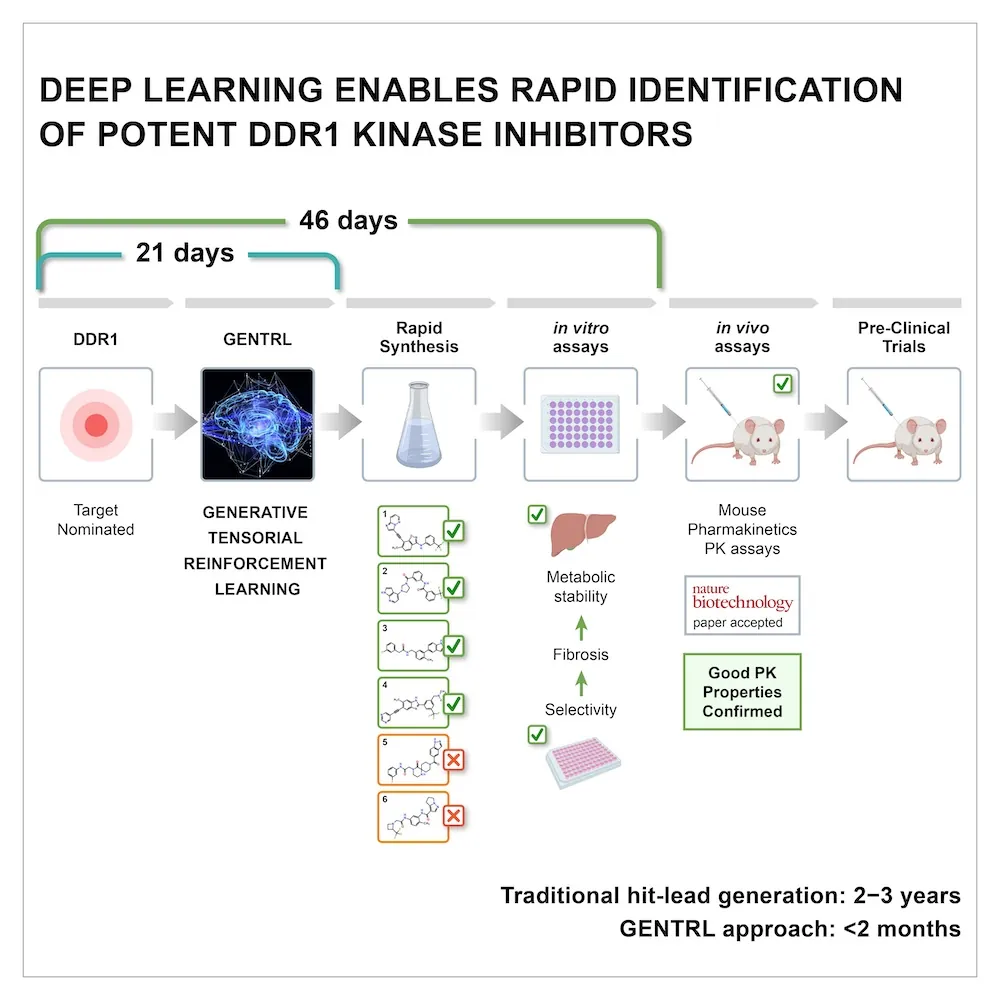A New Era Beckons as First Drug Is Created by AI

Insilico Medicine has achieved a world first by successfully designing, synthesizing, and validating a new drug from the ground up and taking just 46 days to do so. It achieved this impressive feat using AI. This is the first time that AI has been used to successfully create a new drug, and it took record time compared to traditional methods.
The company used Generative Adversarial Networks (GANs) back in 2016 to design new kinds of molecules and have further developed the system, combining it with reinforcement learning (RL) in order to develop new drugs and biomarkers.
The new drug works by blocking the activity of the DDR1 kinase, which is implicated in fibrosis. Fibrosis currently has no cure, and, as such, a drug that could effectively treat it would address an urgent unmet medical need. The study has been published in the journal Nature Biotechnology today.

September 2, 2019, London, UK: Deep Knowledge Analytics acknowledges the new ground-breaking result of Insilico Medicine, which succeeded to design, synthesize and validate a novel drug candidate end-to-end in just 46 days, which is 15 times less compared to what it typically takes even for the best pharma corporations capable to conduct the most efficient R&D process, as documented in a new scientific paper published in the peer-reviewed journal Nature Biotechnology on September 2, 2019.
This accomplishment is the culmination of Insilico Medicine’s efforts in pioneering the use of cutting-edge techniques in AI and Deep Learning (specifically, the combination of Generative Adversarial Networks and Reinforcement Learning) for drug discovery and biomarker development, which began more than 2 years ago.
“When Deep Knowledge Ventures chose to lead Insilico Medicine’s seed funding round in 2014, we did so because we saw their potential to increase Quality-Adjusted Life Years (QALY) for the betterment of humanity as a whole. Since then they have been the first to use cutting edge deep learning techniques like Generative Adversarial Networks to design novel drug candidates from scratch with specified molecular properties in 2016, and in 2018 to succeed in designing, synthesizing and validating a new drug end to end in less than 2 months. And, importantly, they have made efforts to release their code open-source for public use, to further the efforts of other researchers” said Dmitry Kaminskiy.
Insilico Medicine was the first to utilize Generative Adversarial Networks (GANs) to generale novel molecules in 2016, and since then have spent two years developing the theoretical base for the combined use of GANs and RL, documented in 15+ papers and 80+ conference presentations. Now, for the first time, these efforts have been utilized to design a novel DDR1 kinase inhibitor from scratch in just 21 days, and then to synthesize and preclinically validate the new drug in just 25 days (46 days end-to-end).
The company screens potential drug candidates using GANs. These specialized algorithms create synthetic datasets that are indistinguishable from real datasets by having two neural networks compete against each other. One neural network generates the data and the other compares it to a real data set in iterative cycles so that the degree of error in the synthetic data set is gradually decreased. Rather than using trial and error when looking for molecular leads, requests are made to the network to generate specific leads and leads are generated on demand.
Furthermore, the use of AI in drug discovery has the power to do more than just accelerate drug development timelines. It also has the potential to vastly increase efficiency and decrease preclinical failure rates (which are currently over 99%) by discovering drugs in an intelligent and focused manner, designing particular molecular properties according to the specifics of a given disease target, rather than trying to discover them using a blind, random, trial-and-error method.
“The drug discovery process consists of many phases and often takes decades. In preclinical phases the failure rates are over 99%. Our AI can be used in all phases and in some cases lead to superhuman results. Our AI is exceptionally good at finding the molecular targets in specific diseases and inventing new chemistry” said Alex Zhavoronkov, CEO of Insilico Medicine.
What is also striking is the fact that this new GAN-RL approach represents less than 1% of Insilico Medicine’s lead generation pipeline, and that they are hard at work to ensure that the fruits of their labour are as accessible as possible for other researchers to build on their own progress, and to expedite the industry-wide penetration of AI in pharma, drug development and clinical translation.
This can be thought of as Pharma’s AlphaGo moment, when the potential for AI to radically transform the normal operating procedures and business models in the Pharma industry becomes tangibly obvious to the public. In the case of the AI industry, this was when the AI company DeepMind (acquired by Google for $0.5 billion) succeeded to develop the first computer program capable of beating a professional human world champion in the game “Go”. In the case of the Pharma industry, this may very well be its analogous, totally game-changing moment – the first time a drug was designed from scratch and validated not in years, but in days.
– Official press release
Conclusion
We will be following the progress of the drug with interest and hope that this is the start of a new era of drug discovery and development using the power of deep learning.







